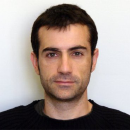Francesc Lopez-Giraldez is currently the Associate Director of Bioinformatics at the Yale Center for Genome Analysis, Yale University. He has over 10 years of bioinformatics experience with a broad background in the fields of genetics and genomics, with specific training and expertise in key research areas in these fields, such as next generation sequencing (NGS) data analysis. In 2006, he received a PhD in Evolutionary Genetics from the Autonomous University of Barcelona. From January 2007 to December 2011, Dr. Lopez-Giraldez was a Postdoctoral Associate at the Department of Ecology and Evolutionary Biology at Yale University.
As postdoc at Yale University, his research goals were focused on developing software and experimental advances for the analysis of data generated from high-throughput projects. For the last 4 years, he has provided consultation, experimental design planning, and data analyses for over 200 NGS projects, mainly for the Yale Cancer Center. These projects included a wide range of techniques such as De Novo assembly of transcriptomes/genomes, variant calling, gene expression analysis, and CHIP-seq, among other techniques. He has also been an investigator of the Yale Center for Mendelian Genomics (CMG). The Yale CMG is funded by the National Human Genome Research Institute (NHGRI) and National Heart, Lung and Blood Institute (NHLBI) of the National Institutes of Health (NIH), with the purpose of identifying genomic mutations underlying Mendelian diseases using modern genome-sequencing technologies.
Next-Generation Sequencing and it's Applications in Biomedical Research
The so-called “next-generation” sequencing (NGS) technologies allows us, in a short time and in parallel, to sequence massive amounts of DNA, overcoming the limitations of the original Sanger sequencing methods used to sequence the first human genome. NGS technologies have had an enormous impact on biomedical research within a short time frame. This talk will give an overview of these applications with specific examples from Mendelian genomics and cancer research.

